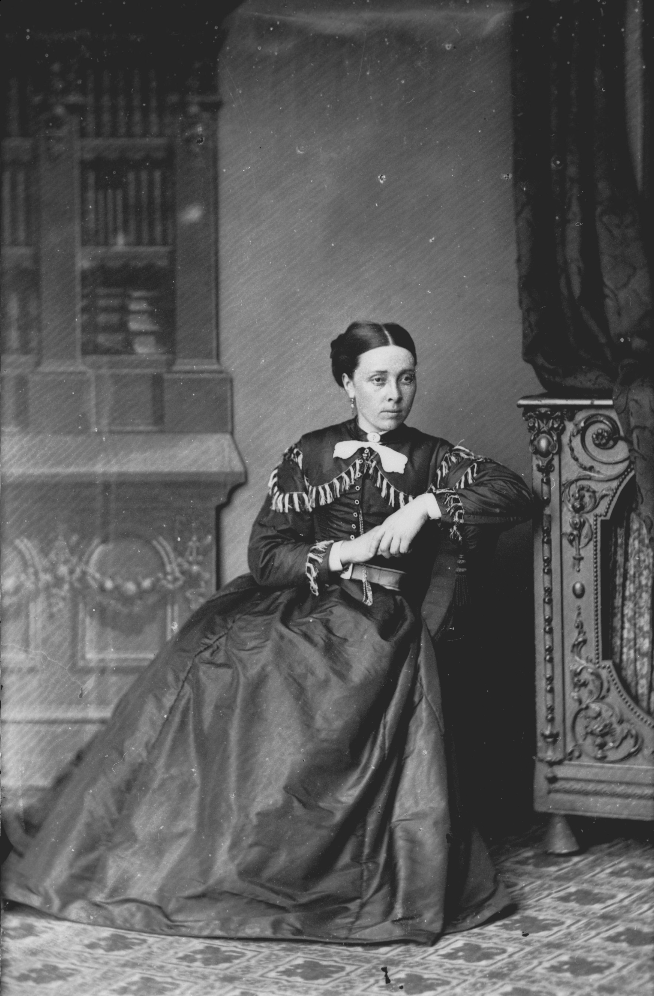The Queer Life of Cranogwen
In 1865 Cranogwen won in the National Eisteddfod at Aberystwyth with ‘Y Fodrwy Briodasol’ (The Wedding Ring), which expresses criticism of the expectation on women to marry through the viewpoints of four brides, including one suffering domestic abuse. She beat famous male poets such as Islwyn, as Cranogwen, a bardic name made up of the names of Saint Caranog, who Llangrannog was named for, and the nearby river Hawen. With continued success at Eisteddfodau, Caniadau Cranogwen was published in 1870 and Cranogwen spoke across Wales, and toured as a Methodist lay preacher, including two American tours.
In 1974, Fanny Rees, from Llangrannog, contracted tuberculosis and moved into Cranogwen’s family home to die her arms. Cranogwen’s grief at the tragic end of her first same-sex relationship is described in autobiographical writings, as are her poetry to women thought of as her most passionate writing, such as ‘Fy Ffrynd’ (’My Friend’). (There is also a passionate poem to her, by Buddug, which describes how she nearly worships and admires the ‘immortal’ Cranogwen.) As Cranogwen continued to live with her parents, Jane Thomas lived next door, as her supportive and committed partner. When Cranogwen’s parents died, she sold the house and lived with Jane for the last twenty years of her life.
From 1878, Cranogwen was editor of Y Frythones - not the first magazine for Welsh women but the first edited by a woman - which had more proto-feminist and even queer messages than its predecessor, though still contained lessons on being a respectably middle class and religious woman. But within these lessons, Cranogwen promoted Welsh women’s writing, ensuring Y Frythones was written for women by women, told her readers they did not all need to marry, like ‘the woman here by our side’ (Jane Thomas) and would give answers, in the ‘Questions and Answers’ column, that can now be analysed as queer. In 1887, when a reader wrote in questioning short bob hairstyles on women, saying she could not tell whether those with these hairstyles were girls or boys, Cranogwen answered: “First of all, then, ask that person which he or she will be, a boy or a girl? Then proceed with your business.” When readers asked about women becoming preachers, like Cranogwen herself was, she concluded that, “Gender difference is nothing in the world.”
Cranogwen was a sailor, teacher, poet, writer, editor, temperance activist and much more. Her legacy is a feminist legacy - ‘Llety Cranogwen’, a shelter for homeless women and girls was founded in the Rhondda by the South Wales Temperance Union and Cranogwen was one of the women who contributed to Welsh women’s writing and education. She continues to be an inspiration, to the Welsh group ‘Cywion Cranogwen’ and to modern Welsh magazines by and for Welsh women, such as ‘Codi Pais.’ Her legacy is also a queer legacy, inspiring queer women and people, and Cranogwen was open about her relationships in her own lifetime (though as 'romantic friendships), which are now too often erased in the teachings about this ‘immortal’ woman. Fanny Rees and Jane Thomas, who loved and supported Cranogwen, and the queer themes in poetry by and to Cranogwen, should now be permanently included in her history. Their histories should not be erased and neither should the significance of Cranogwen’s legacy to LGBT+ people, and especially queer women.
Sources & further reading:
- Cranogwen, Caniadau Cranogwen, & Cranogwen ed Y Frythones.
- Jane Aaron, ‘Gender Difference is Nothing,’ Queer Wales, ed Huw Osborne & ‘Developing Women’s Welsh-language Print Culture’ Nineteenth Century Women’s Writing in Wales.
- Katie Gramich & Catherine Brennan ed Welsh Women’s Poetry, 1460-2001: An Anthology.
- Norena Shopland, Forbidden Lives: LGBT Stories of Wales. - Sian Rhiannon Williams, ‘Y Frythones: Portread Cyfnodolion Merched y Bedwared Ganrif ar Bymtheg o Gymraeg yr Oes,’ Llafur, IV, 1 (1984).
Photo via National Library of Wales | Llun o Lyfrgell Genedlaethol Cymru.


Comments
Post a Comment